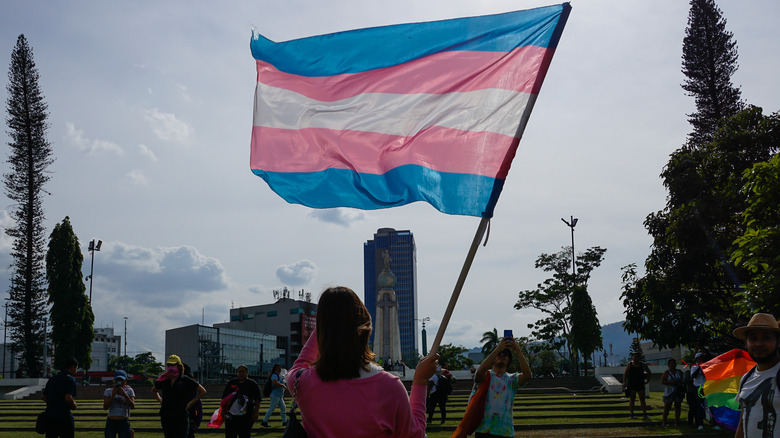It's A Difficult Time For The LGBTQ+ Community In This Country — Here's How You Can Support Your Loved Ones - Exclusive
With the current social and corporate wave of anti-LGBTQ+ rhetoric, this year's Pride feels more important than ever. Between Target removing their Pride merchandise to Budweiser backpedaling on LGBTQ+ support in the face of the backlash against Dylan Mulvaney, corporate Pride support has faced a reckoning in 2023 (although not all brand support is bad). This, coupled with widespread anti-LGBTQ+ legislation across the U.S. is exhausting and, frankly, terrifying, especially for members of the community. While Pride for many has become a fun and colorful celebration of life, it feels important to remember that it started with a discriminatory raid that led to the Stonewall Riots and six days of protests, all in the name of human rights, the recognition of identity, and the freedom to be who you are.
With the LGBTQ+ community facing the loss of their hard-fought, and already-won rights, it can sometimes be difficult for allies to know exactly how to show up. While a person's intentions might be good, not being a part of this marginalized community can make it hard to know what actions would be the most helpful or effective. Luckily, Dr. Ronita Nath (she/her), VP of Research at The Trevor Project, talked exclusively with Women.com about ways you can help support the LGBTQ+ community during this difficult time.
Educate yourself and others
Dr. Nath started off by telling us, "You don't have to be a mental health professional to support the LGBTQ+ people in your life." Small things, from making sure to use gender-inclusive language to asking someone their pronouns can go a long way to helping LGBTQ+ community members feel at ease. A Trevor Project survey found that 50% of trans and nonbinary youth reported that not a single person in their household respected their pronouns. This not only creates an unsupportive environment, but has also been shown to lead to higher rates of life-ending ideation and suicide.
"A key part of allyship is devoting time and energy to educating yourself and others, and refraining from having LGBTQ+ people bear the burden of educating everyone about their lived experiences," Dr. Nath elaborated. She also suggested that allies should visit their closest LGBTQ+ Community Center and/or seek out online resources, in order to better educate themselves on the issues affecting the LGBTQ+ community. The Trevor Project and the Human Rights Campaign both provide online resources to help you understand different aspects of the LGBTQ+ community, experience, as well as ways to become a better ally. Beyond personal education, Dr. Nath also recommended sharing your knowledge with your own network of family and friends to help educate the larger community.
Check in
An important element of allyship is taking the time to be involved, especially if you'd like to broach the subject of mental health with someone. "It's important to take the time to regularly check in with your colleagues and loved ones to organically set the stage for conversations around mental health within your professional and social circles," Dr. Nath explained. Survey data from The Trevor Project indicates that 24% of LGBTQ+ youth reported having been physically threatened or harmed in the last year due to their sexual orientation or gender identity, while almost two in three reported worse mental health after hearing about anti-LGBTQ+ legislation. The time is now for true allyship and there is no better way to show support than to check in with members of the community in meaningful ways.
Dr. Nath went on to explain that, if you do notice an LGBTQ+ friend or family member struggling with their mental health, you should utilize the C.A.R.E. method (Connect, Ask, Respond, Empower). These steps can help ensure you're supporting your loved ones in a respectful and important way. Connect means anything revolving around actively reaching out to someone if you notice something might be wrong. Ask is rooted in asking those difficult questions, especially if you believe someone might be considering self-harm or suicide. Respond with compassion if someone does open up about their mental health struggles. Empower the person you're talking to by empathetically providing information, resources, and (of course) support to help them.
Create a safe space
Dr. Nath emphasized how important it is to have LGBTQ+-affirming spaces at home. "With your LGBTQ+ loved ones and colleagues, be welcoming to their LGBTQ+ friends or partners, talk respectfully about their LGBTQ+ identity, and support their gender expression." While this might sound simple, it's deeply necessary, especially when you consider that only 38% of LGBTQ+ young people reported their home as a safe space. A little goes a long way in terms of acknowledging someone's experience and identity, and it can be a powerful way to positively influence someone's life.
"[Our] research found that having at least one accepting adult in a young LGBTQ+ person's life can reduce the risk of a suicide attempt by 40%. You can be that one person — let the LGBTQ+ people in your life know that you love them, respect them, and support them just the way they are," Dr. Nath explained. While many young LGBTQ+ members find support and welcoming environments online, many still struggle to feel safe in their home and school environments. This lack of safety is even worse at community events, where only 16% of LGBTQ+ youth reported that these events provide affirming spaces.
Enact change
2023 has already set multiple records, with over 520 anti-LGBTQ+ bills introduced in state legislatures across the country, and 70 anti-LGBTQ+ laws actually having been enacted so far. Dr. Nath explained how dangerous these recent anti-LGBTQ+ bills have been, emphasizing, "These harmful policies and attacks have the potential to exacerbate bullying, violence, and discrimination — all of which we know to be consistent risk factors for suicide."
While voting is, of course, key in changing nationwide policies and fighting anti-LGBTQ+ legislation, there are many other ways to also support the LGBTQ+ community. From smaller things like sharing your pronouns in your email signature to implementing gender-neutral bathrooms in your workplace to volunteering with local LGBTQ+ equality organizations, there are many proactive ways to be a great ally. Dr. Nath also emphasized how powerful it can be to call your elected officials and voice your opposition to anti-LGBTQ+ legislation. Most importantly, she emphasized, "Now, more than ever, it's crucial for all of us to make a concerted effort to create safe spaces where LGBTQ+ young people feel comfortable to express themselves freely."
If you or someone you know needs help or support, The Trevor Project's trained crisis counselors are available 24/7 at 1-866-488-7386, via chat at http://TheTrevorProject.org/Get-Help, or by texting START to 678678.




